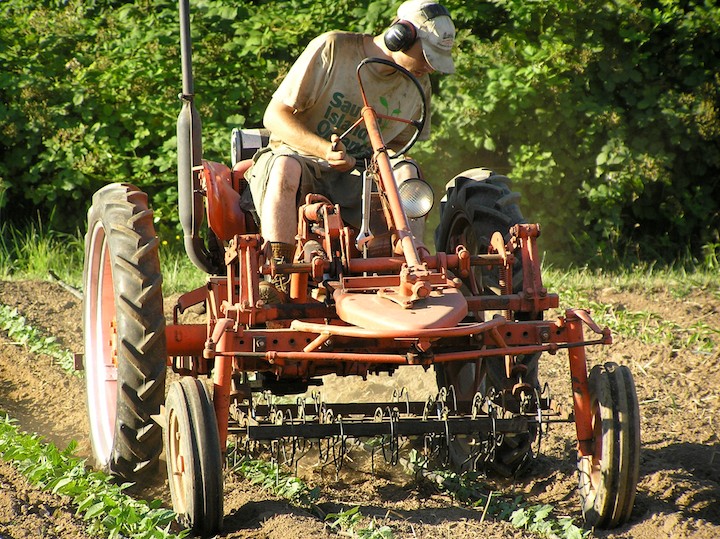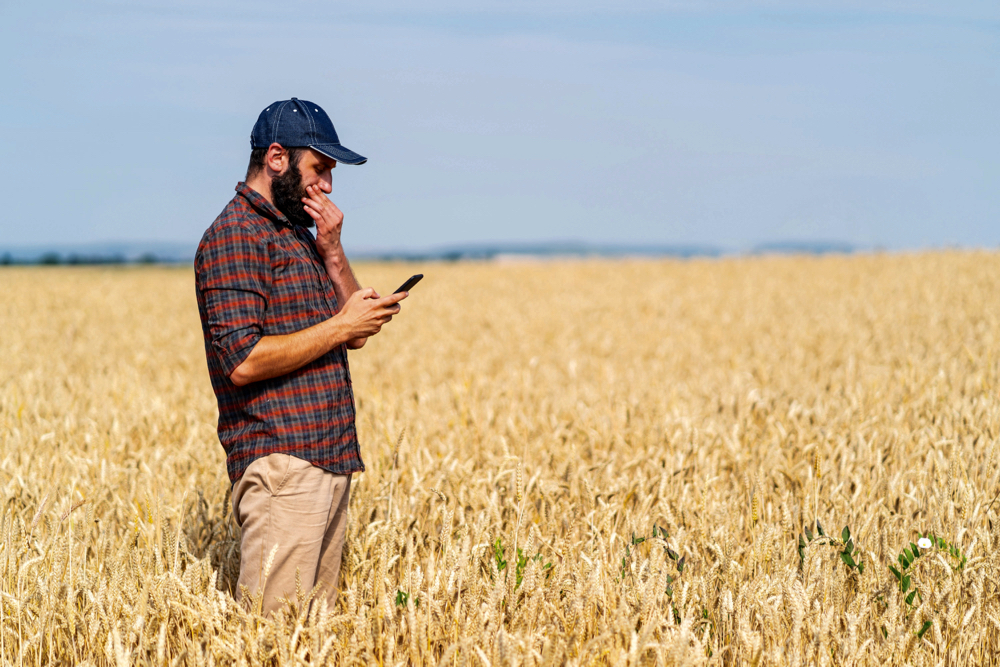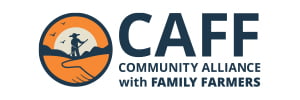
DECEMBER 8th & 9th, 2019
Sonoma County, CA
Tools and technology can help farmers improve efficiency, save labor and connect with their customers. But many of today’s innovations are built for large-scale production, out of reach for many family farmers. Join us for this event showcasing what’s possible for tech in small-acre and sustainable agriculture. From cost-effective tools to software that streamlines direct sales, practical tractor implements to data management to help you better understand what’s happening beneath your fields. Whether you’re growing 20 acres of row crops or just tending a quarter acre market garden, managing a small-scale ranch or a family-owned vineyard, come learn the latest in appropriately-scaled Ag Tech, interact with innovators and start working smarter, not harder.
FEATURING
On-farm Tool Demos
Exhibition Hall
Jerry-Rig Corner
Workshops & Panels
Innovator’s Contest
Plenary: Future of Tech

CHECK OUT THESE TOOLS IN ACTION!
























$30 Admission
$20 Student, New Farmer & Member Discount
Admission gets you access to either or both days: Sunday evening’s Forum and/or Monday’s Expo
SANTA ROSA JUNIOR COLLEGE
SHONE FARM
Voted #1 campus farm in the Nation!
Shone Farm, Santa Rosa Junior College
7450 Steve Olson Ln., Forestville, CA 95436

SUNDAY, DEC 8th
Early Bird Expo & Tool Exhibits: 3pm
Opening Reception & Plenary: 5 – 8pm
MONDAY, DEC 9th
Doors Open: 8am
Workshops & Demos: 9am – 5pm
Innovation Challenge & Closing Remarks: 5 – 6pm

FARMING IN THE AGE OF BIG TECH:
The Digital Revolution, Your Data & the Future of Family Farms.
SUNDAY, DECEMBER 8
5PM – 8PM
This talk serves as the opening reception of the Small Farm Tech Expo, taking place the following day, Monday the 9th, which will focus more on practical tools and workshops for the small-scale farm. Admission will get you entry to either or both days (though no one will be turned away from the evening forum for lack of funds). Wine and other libations included.
Mechanization and the digital revolution has transformed our lives. Just as the “internet of things” has digitized everything from watches to refrigerators and mechanization has upended entire industries, these technologies are also changing the face of agriculture. Mechanization continues to scale up, consolidating the industry. Farm equipment is becoming increasingly digital and many new technologies collect massive amounts of data from farms and farmers, which some say gives growers more precise control over their operations while others fear a loss of control.
As with other industries, tough questions arise as these technologies zoom us into the future faster than our society can adapt. Join us to learn about the history of mechanization and more recent issues related to digital agriculture. Who owns the data collected by digital farming technologies? What kind of farming practices are encouraged by newer forms of mechanization and digital technologies? Who do these technologies leave behind? And do farmers have the right––and the abilities––to repair their digital equipment?
###
PRESENTERS:
Ildi Carlisle-Cummins is Executive Director of the California Institute for Rural Studies. She started the Cal Ag Roots Project, a storytelling project that produces podcasts about the history of California farming. Ildi holds an M.S. in Community Development from UC Davis, where she also worked as a researcher, studying community food systems and California agriculture.
Laura Mann is an Assistant Professor in the Dept of International Development and a research affiliate of the Firoz Lalji Centre for Africa. She is sociologist whose research focuses on the political economy of development, knowledge and information and communication technologies in Africa. Before joining the LSE, she worked as a postdoctoral researcher at the Oxford Internet Institute and at the African Studies Centre in Leiden.
Chris Bross was born in Wisconsin, where his father worked for Allis-Chalmers, one of the biggest manufacturers of agricultural tractors in the past century. His first job at 12 years old was working on a small local farm picking crops and going to sell at Saturday market. Now Chris manages strategic partnerships at iFixit, creators of the free repair guide for everything, written by everyone. iFixit is a founding member of repair.org, leading the Right to Repair movement by authoring legislation to change state and international laws enabling the right for everyone to repair everything they own.
| Classroom #1 | Classroom #2 | Farm / Expo Hall | Farm / Expo Hall | |
| 8 – 9am | Arrival / Check in | |||
| 9 – 10:15am | Reducing On-Farm Waste | Task Management Tools | Composting Tools | Tool Demos (see full schedule below) |
| 10:45am – Noon | Water Conservation Tools | Customizing Tools | Fences & Fire | |
| 12:00 – 1:30pm | Lunch Break | |||
| 1:30 – 2:45pm | Alternative Energy | Rural Broadband & Ag Tech | Chicken Coops | |
| 3:30 – 4:45pm | Tools, Concept to Product | Sales / Distribution Software | Integated Pest Management | |
| 5 – 6pm | Innovator’s Challenge |
Customizing Tools for Your Farm’s Efficiency
 Using examples from his own farm, Josh will discuss ergonomic, economic and production considerations, and how he applies those in customizing and designing tools for more efficient systems on his small farm and for others.
Using examples from his own farm, Josh will discuss ergonomic, economic and production considerations, and how he applies those in customizing and designing tools for more efficient systems on his small farm and for others.
Josh Volk is the proprietor of Slow Hand Farm in Portland, Oregon, and has been working on and managing small farms around the United States for the last 20 years. He graduated with a BS in Mechanical Engineering before getting interested in small scale food production as a way to support local communities. He travels around the world, consulting with farmers and researchers, teaching new farmers, and presenting workshops. He is also the author of the book “Compact Farms” from Storey Publishing.
Rural Broadband & Ag Tech

Robert Tse is Senior Policy Advisor, for the Telecommunications Program, Rural Utilities Service, Rural Development, USDA. Previously he was State Broadband Coordinator for USDA CA Rural Development. He served as Deputy Director for International Trade in the Governor’s Office of Economic Development and as Deputy Secretary for the California Department of Food and Agriculture under Governor Schwarzenegger. He is a 17-year veteran of the USDA Foreign Agricultural Service.
Farm Tools, from Concept to Product
 How do good ideas transform into practical on-farm products? In this workshop, learn the process behind product development, from harvesting tools to flame weeders to innovative transplaters. It might just be more accessible than you think, with crafty farmers tinkering in barns playing a vital role. Learn about the manufacturing process impact, prototyping process, and effective testing.
How do good ideas transform into practical on-farm products? In this workshop, learn the process behind product development, from harvesting tools to flame weeders to innovative transplaters. It might just be more accessible than you think, with crafty farmers tinkering in barns playing a vital role. Learn about the manufacturing process impact, prototyping process, and effective testing.
Bradford Waugh is the Product Development Engineer for Johnny’s Selected Seeds. Brad has spent over a decade developing products and ideas for several different product categories for Brands like Trident, Anheuser-Busch, and Google. His experience has enabled him to work on almost every phase of new product development. He is now focused on improving Johnny’s existing tools and help the Johnny’s tool brand bring new products to life.
Tools for Biointensive IPM & Solarization
 One of the most challenging issues facing small farmers is finding economically viable and environmentally sustainable strategies to control weeds and pests. Biointensive integrated pest management (IPM) is a systems approach to pest management that is based on proactive measures that redesign the agricultural ecosystem to the disadvantage of insect pest and to the advantage of its natural enemies. Habitat plants, and innovative approaches to managing habitat plants for beneficial insects will be discussed as well as sources of cost share programs available through state and federal agricultural agencies that can help fund establishment of these habitats. Also learn about solarization, consisting of heating the soil with clear plastic mulch on moist soil debilitating many soil pathogens, insects, nematodes, weed seeds and seedlings. Biosolarization combines solarization with anaerobic soil disinfestation (ASD) producing organic compounds that are toxic or suppressive to soil pest and diseases.
One of the most challenging issues facing small farmers is finding economically viable and environmentally sustainable strategies to control weeds and pests. Biointensive integrated pest management (IPM) is a systems approach to pest management that is based on proactive measures that redesign the agricultural ecosystem to the disadvantage of insect pest and to the advantage of its natural enemies. Habitat plants, and innovative approaches to managing habitat plants for beneficial insects will be discussed as well as sources of cost share programs available through state and federal agricultural agencies that can help fund establishment of these habitats. Also learn about solarization, consisting of heating the soil with clear plastic mulch on moist soil debilitating many soil pathogens, insects, nematodes, weed seeds and seedlings. Biosolarization combines solarization with anaerobic soil disinfestation (ASD) producing organic compounds that are toxic or suppressive to soil pest and diseases.
Martin Guerena is the Sustainable Agriculture Specialist for National Center for Appropriate Technology. Martin most recently served as the Integrated Pest Management Specialist with the city of Davis, California. He is also a licensed Pest Control Advisor and has experience as a teacher, farm manager and extension agent with the University of Arizona.
Rex Dufour is the CA Regional Director for the National Center for Appropriate Technology. Rex Dufour’s background is in entomology and integrated pest management. His work experience includes managing sustainable development projects in Thailand and Laos. Mr. Dufour has worked as both project manager and program specialist for NCAT and heads NCAT’s California office. In addition to the ATTRA project, he is involved in several minority farmer outreach projects.
Composting Tools & Technology for the Small Farm
 Building soil carbon is at the root of soil health and regenerative agriculture while positively affecting climate change. Compost is a valuable tool to increase soil organic matter. In this workshop we will look at various on-farm composting systems and the tools involved: windrows turned by loader or windrow-turner, covered aerated static pile (passive and active) and biodynamic composting. Learn the regulatory requirements, discuss process monitoring, indicators for finished compost as well as it’s end-use.
Building soil carbon is at the root of soil health and regenerative agriculture while positively affecting climate change. Compost is a valuable tool to increase soil organic matter. In this workshop we will look at various on-farm composting systems and the tools involved: windrows turned by loader or windrow-turner, covered aerated static pile (passive and active) and biodynamic composting. Learn the regulatory requirements, discuss process monitoring, indicators for finished compost as well as it’s end-use.
Will Bakx is co-founder and owner of Sonoma Compost and is the Project Manager at Renewable Sonoma. Will is a pre-eminent soil scientist who has devoted his life to advancing the composting industry. With 37 years of experience and expertise in all aspects of composting, Will brings a breadth of knoweldge on producing advanced, environmentally-friendly compost. He is Adjunct Instructor at the SRJC for the Agricultural Composting Class.
On-Farm Task Management
 Despite the myth of farming as the “simple life”, we all know that farm management, with all its many moving pieces, can be complex. In this workshop, we’ll hear from three farmers who are utilizing digital technologies to manage tasks and teams. From farm crew communications to planting and harvesting schedules, there are increasingly more options available to farmers, from new farm-specific software to everyday phone apps. Hear how these farmers are working smarter, not harder. And the pros and cons of many different systems.
Despite the myth of farming as the “simple life”, we all know that farm management, with all its many moving pieces, can be complex. In this workshop, we’ll hear from three farmers who are utilizing digital technologies to manage tasks and teams. From farm crew communications to planting and harvesting schedules, there are increasingly more options available to farmers, from new farm-specific software to everyday phone apps. Hear how these farmers are working smarter, not harder. And the pros and cons of many different systems.
Anthony Blondin has been farming since 1996 and has been the Coordinator of Operations at Shone Farm for the past three years.
Kritters Blevins currently co-manages Mountain Bounty Farm in Nevada City, CA, which grows mixed vegetables for a large year-round CSA, wholesale, and a local farmers market. Kritters coordinates irrigation, all things field prep and oversees one of two farm sites. (pronouns are they/them/theirs)
Benjamin Fahrer, Top Leaf Farm
Fences & Fire: Tech for Grazing & Land Management

As land prices rise, climate changes and farmers, ranchers and land managers risk financial failure and the threat of fires, a few ancient ways of land-tending are providing a semblance of hope for California producers and land-owners alike. Mobile grazing operations, not unlike those of yesteryear, have reopened a door to land management that provides food, fiber, and improved soil health while simultaneously reducing the risk of fire damage to our built environment. Fire itself—a land management tool that dates back millennia—is as well garnering evermore interest in the field of ecological stewardship and wildfire preparedness. Hear from nomadic Grazers, ranchers and other land stewards about new tools, from electric fencing to prescribed burning, now being used to create healthier ecosystems and safer communities.
Jared Childress is the Prescribed Fire Specialist for Audubon Canyon Ranch’s Fire Forward program.
Aaron Gilliam is the owner of Sweet Grass Grazing, a land management and contract grazing operation based in the North Bay.
Reducing On-Farm Waste
 From plastic mulch to produce packaging to drip tape, plastic can make farms more efficient. But it also adds to the trash our farm businesses create. In this workshop, we’ll hear about tools and new tech that helps reduce on-farm waste, from biodegradable mulch to cardboard berry boxes to reusable, washable tubs for your CSA customers.
From plastic mulch to produce packaging to drip tape, plastic can make farms more efficient. But it also adds to the trash our farm businesses create. In this workshop, we’ll hear about tools and new tech that helps reduce on-farm waste, from biodegradable mulch to cardboard berry boxes to reusable, washable tubs for your CSA customers.
Franchesca Duval is the Head Chicken Wrangler at Alchemist Farm in Sebastopol, a humane chicken and quail hatchery. She is passionate about going zero waste and shifting the poultry industry one plastic-free shipment of chicks at a time.
Ben Hansen, 24 Carrot Farm
Sales & Distribution Software
 Remember showing up to the farmers market with whatever you could harvest? Well, now that you’re selling to distributors, wholesale accounts or multiple clients, jotting down orders on a pad of paper doesn’t exactly suffice. While Big Ag now operates in a high-tech universe of automated distribution, one of the greatest barriers to a more successful local food system comprised of small farms is a disjointed distribution infrastructure. Find out how new tech companies and local distributors are working to tighten up those systems to accommodate the unique circumstances of small-scale farmers.
Remember showing up to the farmers market with whatever you could harvest? Well, now that you’re selling to distributors, wholesale accounts or multiple clients, jotting down orders on a pad of paper doesn’t exactly suffice. While Big Ag now operates in a high-tech universe of automated distribution, one of the greatest barriers to a more successful local food system comprised of small farms is a disjointed distribution infrastructure. Find out how new tech companies and local distributors are working to tighten up those systems to accommodate the unique circumstances of small-scale farmers.
Joshua Rosen is the Founder & CEO at FRESHr, an online marketplace that aggregates and updates supply and demand for fresh local produce in real-time.
Tim Page runs the Farmers’ Exchange of Earthy Delights — also known as F.E.E.D. Sonoma— a produce distribution company that works closely with 50 small scale farmers throughout the North Bay.
Sri Sabesan, CEO of Tier1Digital, has vast history of over 30 years delivering latest software innovations to enterprise customers and is now bringing that experience to Ag and Food industry, with a focus on bringing state of the art technology accessible to smallholder farmers.
Alternative On-Farm Energy
 Whether it’s energy independence or reducing our carbon footprint, farmers are adopting alternative forms of energy to power their farms, tractors, fencing and more. Learn about creative ways that farms are harnessing the sun, innovations in solar power–the challenges to overcoming fossil fuel dependence as well as the opportunities that these technologies can offer our farms and food system.
Whether it’s energy independence or reducing our carbon footprint, farmers are adopting alternative forms of energy to power their farms, tractors, fencing and more. Learn about creative ways that farms are harnessing the sun, innovations in solar power–the challenges to overcoming fossil fuel dependence as well as the opportunities that these technologies can offer our farms and food system.
Paul Muller is the co-owner of Full Belly Farm, a diverse farm located in the Capay Valley that has been farmed using organic practices since 1985 and has implemented a number of on-farm solar projects.
Ernesto Montenero is with Sustainable Technologies, an environmental construction company providing efficient remediation and solar electrical systems on farms around California.
Stephen Heckeroth is the Founder and CEO of Solectrac, working to provide an alternative to fossil fuels with 25 years of experience building electric tractors as well as converting vehicles to electric.
Chicken Coop Evolution: Improving Tools for Pastured Poultry
 Come hear the pros and cons of various methods of raising pasture-based broilers and hens at Green Star Farm and how they’ve evolved their designs over the course of a decade of production. See past iterations and learn about the technical design of their coops, methods for moving and caring for the animals, as well as the economic advantages and disadvantages of each design.
Come hear the pros and cons of various methods of raising pasture-based broilers and hens at Green Star Farm and how they’ve evolved their designs over the course of a decade of production. See past iterations and learn about the technical design of their coops, methods for moving and caring for the animals, as well as the economic advantages and disadvantages of each design.
Sarah Silva, Green Star Farm
Maintaining Crop Quality & Yields Using Less Water
 Several tools are available to help growers schedule irrigation sets to maximize fruit quality and maintain good yields, while using the least amount of water necessary. This workshop will explore a range of options from monitoring soil moisture and plant stress levels, to utilizing integrated software systems that track farm and vineyard specific variables and make precision irrigation recommendations. Join us to learn your pallet of options, and discuss their advantages, disadvantages, and the practical considerations for integrating them into your management system.
Several tools are available to help growers schedule irrigation sets to maximize fruit quality and maintain good yields, while using the least amount of water necessary. This workshop will explore a range of options from monitoring soil moisture and plant stress levels, to utilizing integrated software systems that track farm and vineyard specific variables and make precision irrigation recommendations. Join us to learn your pallet of options, and discuss their advantages, disadvantages, and the practical considerations for integrating them into your management system.
Keith Abeles is a Soil and Water Specialist with the Sonoma Resource Conservation District
Tucker Volk is an Agronomist and Director of Operations at Vintel, a state-of-the-art, web-based decision support system for optimum vineyard management and superior quality wine.
Adrienne Uboldi is Grower Relations Manager at Distinguished Vineyards & Wine Partners, which represents a collection of iconic wineries from some of the world’s most prestigious wine regions.
9:30am Planting Tools
10am Cultivation Tools
10:30am Solar Tractor
11am Drones
11:30am Bicycle powered tractor
Noon Harvest Tools
12:30pm Post-Harvest Tools
1pm No Till Drill
1:30pm Bed Prep Tools
2pm Two-Wheel / Walk-behind Tractors
2:30pm Seed Tools
3pm Traditional Tractors
3:30pm Season Extension
4:00pm Pest Control Tools
GET YOUR TICKETS TODAY!
Admission gets you access to either or both days: Sunday evening’s Forum and/or Monday’s Expo

FARMERS
What technology would you most like to see showcased? What on-farm challenges would you most like addressed by new innovations?
SMALL FARM TECH
INNOVATION CHALLENGE
Leading up to this year’s Expo, we’re hosting an “Innovation Challenge”, inviting you–engineers, farmers, startups, students, tinkerers in garages–to develop a new innovation that can help smaller-scale farms compete, survive and thrive.

HOSTED BY:

MADE POSSIBLE BY:












EXHIBITORS INCLUDE:













